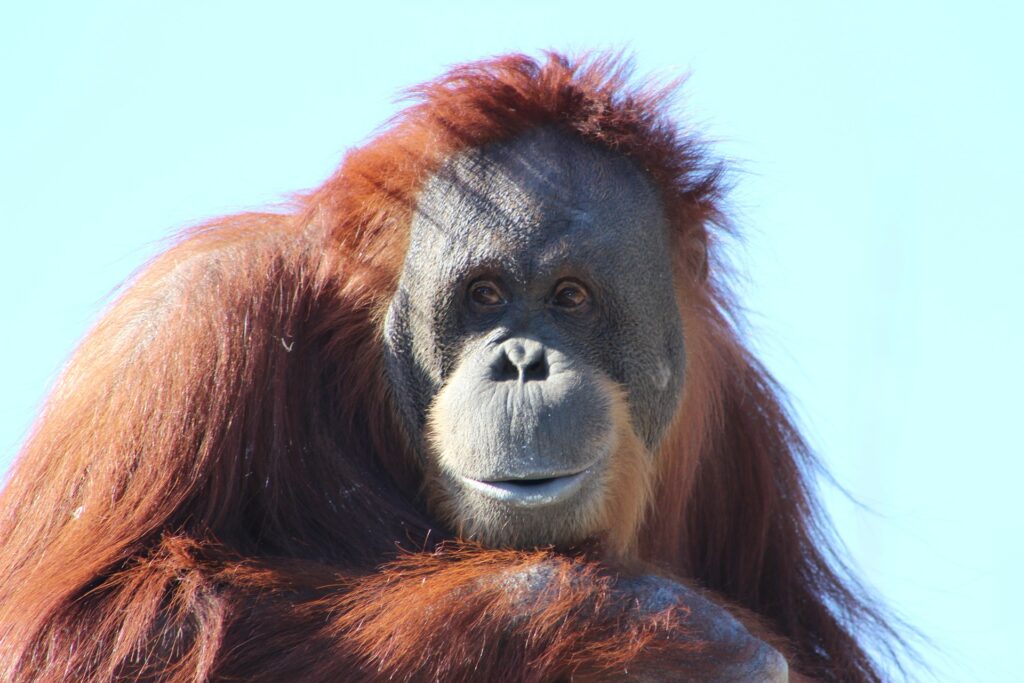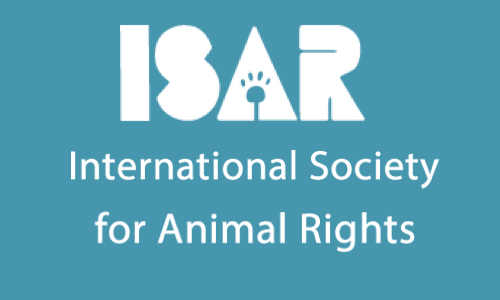In recognition of International Orangutan Day, August 19, 2020, Lori and Peter kick off discussing some of the fascinating facts about these great apes. These gentle creatures are the largest tree-dwelling animals on earth. Indeed they even sleep in the trees, fashioning leafy nests each evening for that purpose. Orangutans are native to only 2 island on earth, Borneo and Sumatra, and their diets consist mostly of fruit (preferring durians), along with flowers, leaves, honey and insects. Males, whose arm spans can reach eight feet and who can weigh 200 lbs., are much larger than females.
Podcast: Play in new window | Download
Subscribe: RSS
Orangutan populations are in crisis due to the world’s seemingly insatiable appetite for palm oil. Native orangutan forests are being destroyed to plant palm oil fields, displacing the apes, who truly have no other alternatives to live.

Consumers around the world can help orangutans in the wild by supporting organizations that shield the forests from devastation, protect wild populations, and rescue orphaned and injured animals. Additionally, we all should curtail our consumption of palm oil to help dry up demand. However, palm oil has become almost ubiquitous in a variety of products like food, lipstick, shampoo, and detergent products. Making it even more challenging, palm oil and its derivatives go by alternative names including palmitate, palm sterine, and sodium laureth sulfate (the full list is at the end of this post).
Lori then continues discussing the health risks of consuming saturated fats which include heart disease, stroke and cancer. Palm oil (as well as meat and cheese) is high in saturated fats.
Due to the established health risks of trans fatty acids in the diet, a requirement to indicate the amount of trans fats in packaged foods went into effect more than a decade ago. Consequently, its use in packaged foods and restaurants gradually declined, and a full trans fat ban in the US went into effect in 2018. However, unfortunately, palm oil gradually has taken its place. Lori explains how this switch occurred and makes recommendations for healthier and more environmentally conscious eating.
Then, Peter welcomes Josie Du Toit, Director at Vervet Monkey Foundation, which is based in South Africa. The Foundation operates a lively rescue and rehabilitation center with the aid of volunteers from around the world. Their wonderful video projects go by the name of The Vervet Forest.
These small primates weigh about 7.5 to 10 lbs, range from central Africa to the southern tip of the continent, consume fruits, berries, leaves, seeds insects and bird eggs,. Their agility and adaptability permits them to thrive in urban areas, often leading to conflict with people. Among its many activities, the Vervet Monkey Foundation teaches how to humanely deter the monkeys from developed areas.
The Vervet Monkey Foundation rehabilitates and provides sanctuary to over 500 primates, orphaned, injured, abused, ex-laboratory or unwanted pets.
We conclude with a discussion about some of the things pet owners and guardians do to and with their animals that really bug us including being breeders (especially those who say they love their breed, or who also claim to do rescue work), walking dogs when the ground is obviously too hot for their paws, buying trendy dogs, like many did after the Obamas got their Portuguese Water Dog, and many, many others!
Ok, below is the complete list from Treehugger of terms that may mean palm oil on products ingredient lists.
1. Elaeis guineensis
2. Ethyl palmitate
3. Glyceryl
4. Hydrogenated palm glycerides
5. Octyl palmitate
6. Palm fruit oil
7. Palm kernel
8. Palm kernel oil
9. Palm stearine
10. Palmate
11. Palmitate
12. Palmitic acid
13. Palmitoyl oxostearamide
14. Palmitoyl tetrapeptide-3
15. Palmityl alcohol
16. Palmolein
17. Sodium kernelate
18. Sodium laureth sulfate
19. Sodium lauryl lactylate/sulphate
20. Sodium lauryl sulfate
21. Sodium palm kernelate
22. Stearate
23. Stearic acid
24. Vegetable fat
25. Vegetable oil



Leave a Reply